
The Minister of Labour, Industrial Relations, and Employment and Creation, Utoni Nujoma, urged social partners to improve the working environment, thereby enhancing employee well-being, high labour productivity, and healthier labour relations.
Utoni Nujoma said this at a two-day meeting on variation and Sensitization in Fishing and Convention 190 with various stakeholders in the fisheries sector at Walvis Bay.
Convention 190 is the first international treaty to recognise the right of everyone to a world of work free from violence and harassment, including gender-based violence.
Namibia became the first African Country and the third in the World to ratify Convention 190 in 2020.
At the opening of the meeting, Utoni Nujoma stated that this legal instrument has become part of the country's laws since Namibia, through the ministry, took a decisive approach to ratifying it and, most importantly, ensuring that it is enforced immediately after ratifications.
Furthermore, he says social dialogue contributes to improving the quality of policies and strategies, enhancing ownership and commitment, and facilitating effective policy implementation at both the national and enterprise levels.
"The implementation of C190 in the fishing industry serves to address the requirements set out not only in the National Labour Legislations in terms of Occupational Safety and Health but also enables Namibia to fully implement the ILO convention 'Work in the Fishing, No. 188, ratified in 2018, respectively."
He added that the status of employment relations in the fishing industry remains unchanged.
Nujoma emphasised that fundamental principles and rights at work require effective social dialogue, better conditions for workers, and more social protection.
"The Government has shown its commitment to addressing key issues that affect the operations in the fishing sector, such as the minimum age for work on a fishing vessel, medical standards, work agreements, occupational safety, and health." As a country, we need to align our national laws to ensure that we are on par with other countries when it comes to these critical issues as stipulated in the Convention."
Also speaking at the event was the employer representative, Edwin Kamatoto, who added that some fishing industry employers have not paid any attention to the Variation in Fishing Sector ratification.
"Only about two to three percent of companies have fully implemented this variation, which is a challenge. We've made a call to the industry that once the variation has been gazetted, the law should be implemented without delay, which is not the current case. Our members are complaining that some of the employers are paying their employees overtime from their fish commission when it is supposed to be calculated against the employees' hourly rate. This is daylight robbery."
This variation was published in the Government Gazette in March of this year, whereby certain Conditions of service or employment have been varied in certain provisions of Chapter 3 of the Labour Act, 2007 (Act No. 11 of 2007) for the Fishing Sector.





